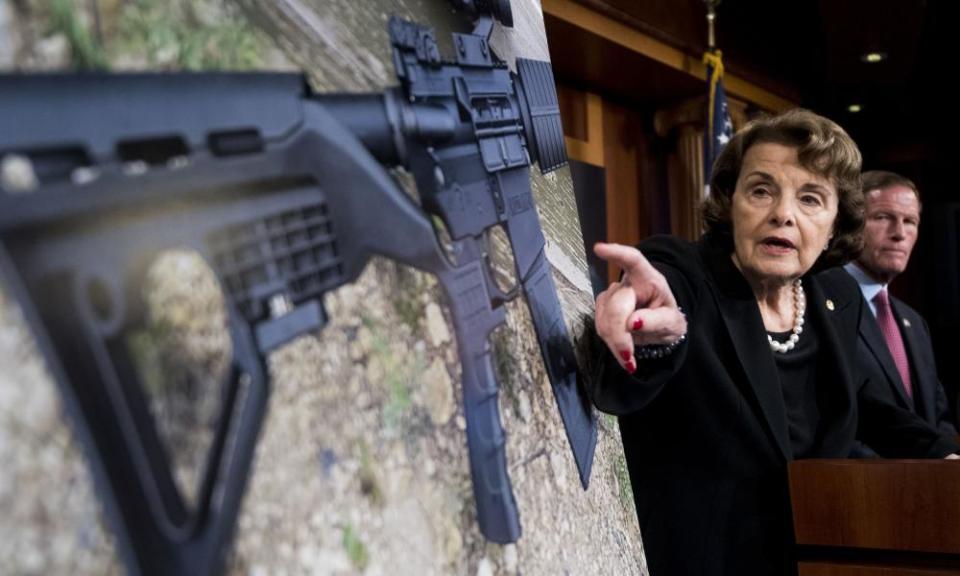Dianne Feinstein introduces Senate gun control bill to ban bump stocks
Senator introduced similar bill in wake of 2012 Newtown massacre
Bump stocks enable semi-automatic weapons to fire like machine guns

Democrats on Wednesday lined up behind a bill that would outlaw the the sale and possession of “bump stocks”, a device the Las Vegas gunman used to retrofit his weapons with rapid-fire capabilities, leaving 59 victims dead and more than 500 injured in just nine minutes.
Senator Dianne Feinstein, a longtime advocate of stricter gun control, introduced the bill, which she had first brought forward after 20 children and six adults were killed in the shooting at Sandy Hook elementary school in December 2012. The earlier bill, which would have reinstated a federal assault weapons ban, failed by a wide margin in the Senate.
Wednesday’s more narrowly tailored legislation would ban the import, sale, manufacturing, transfer or possession of “a trigger crank, a bump-fire” or similar devices that can retrofit semi-automatic weapons to fire at nearly the same rate as automatic ones, which are heavily regulated.
“After Sandy Hook, when 20 first graders were slaughtered, I thought for sure we would act. After Orlando I thought we would act,” Feinstein said, listing mass shootings that have stunned the nation. “And now after Las Vegas, I hope senators will finally summon the political courage to stand up and say, ‘Enough is enough.’”
Bump stocks are legal and can be purchased online for less than $200. A semi-automatic weapon can typically fire between 45 and 60 rounds per minute. When retrofitted with a device, the weapon can fire between 400 and 800 rounds per minute – a rate similar to an automatic weapon, according to Feinstein.
The purchase of automatic weapons has been severely restricted since the 1930s, and in 1986, legislators banned the transfer or possession of machine guns by civilians, though the measure grandfathered in weapons produced before that year.
Feinstein has a long history of pushing for tighter gun laws, dating back to the assassination of the San Francisco mayor George Moscone and supervisor Harvey Milk. Feinstein was the first to discover Milk’s body and deliver the news to the public.
“I know what guns can do,” Feinstein said. But what happened in Las Vegas this week, she said, “is taking it into war”.
An official with the Bureau of Alcohol, Tobacco, Firearms and Explosives (ATF) told reporters on Tuesday that multiple bump stocks had been found in the hotel room used by the shooter, identified by police as Stephen Paddock.
Feinstein dismissed criticism from Republicans, including the Senate majority leader, who on Tuesday said he found it “particularly inappropriate to politicize an event like this”.
“There is no better way to honor the 59 people who were slaughtered than to take action to prevent this from happening yet again,” said Feinstein, a senator from California. “If not, then when will we ever do it?”
Several other Democrats have said they too plan to reintroduce legislation that has previously failed to win support. Connecticut senators Christopher Murphy and Richard Blumenthal, both of whom became fierce advocates for gun control after Sandy Hook, said they planned to introduce bills, respectively, to expand the national gun background check system and close a loophole that allows licensed dealers to sell a weapon if the FBI fails to complete a background check on the buyer within three business days.
Though Feinstein has yet to find a Republican co-sponsor to sign on to the bill, her colleagues have said they believe that this legislation represents the best hope for finding common ground between the parties.
In an early sign, a handful of congressional Republicans have indicated that they would be open to the legislation.
John Cornyn of Texas, the number two Senate Republican, said as a hunter and sportsman he did not understand the use of the bump stock and wanted to have a hearing on it. Senator Ron Johnson, a Republican of Wisconsin, told reporters on Wednesday that he has “no problem” banning bump stocks.
In the aftermath of the Newtown shooting, many Republicans similarly expressed a willingness to revisit gun control legislation. But lobbying by the NRA ultimately proved more powerful and no progress was made.
Feinstein pleaded with Americans who are upset by what they saw in Las Vegas to join their fight. “Please, Mr and Mrs America, help us,” she said. “We know the power that’s on the other side. You have to stand up and help us.”
In the House of Representatives, meanwhile, David N Cicilline, a Republican, and nearly 100 co-sponsors introduced a similar proposes legislation targeting bump stocks. The Automatic Gunfire Prevention Act would ban the manufacture, possession, transfer, sale, or importation of bump stocks.
“No person should possess a device that turns a semi-automatic rifle into the equivalent of a machine gun,” said Cicilline, who serves as vice-chair of the House gun violence prevention task force.

